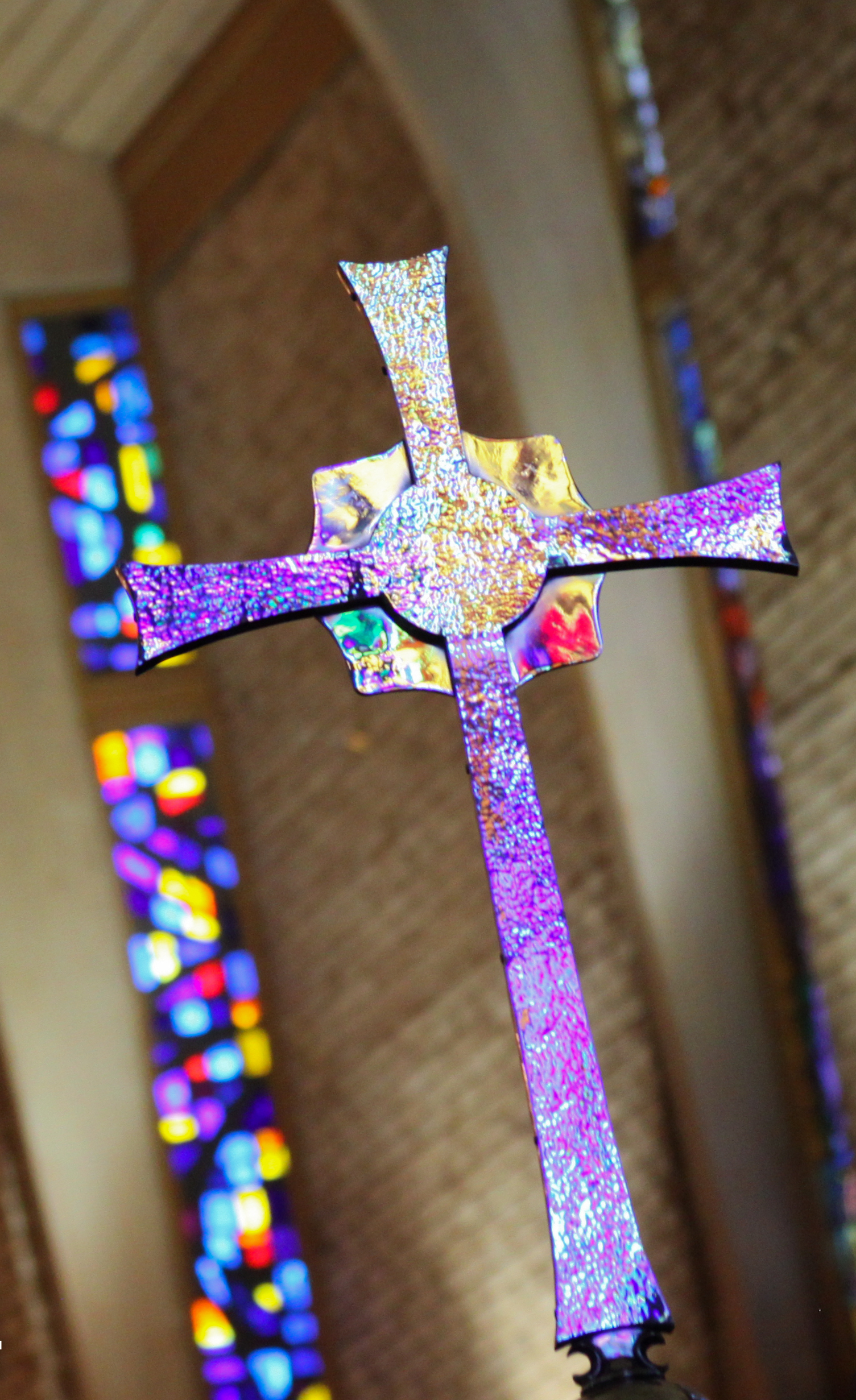This past year has been one of transition and reflection. While serving as interim rector at an Episcopal parish in Nashville, I wrote a number of essays that may some day be collected into a single work. Then again, they may not, so I thought I would begin sharing them here. Part of my reflection was on the question of “who am I,” considering titles, identity, and even my name.
Christian, by name
So it was that for an entire year they met with the church and taught a great many people, and it was in Antioch that the disciples were first called “Christians.” – Acts 11:26
I do not know about other people, but my memories of elementary school are mostly vague and indistinct, with certain moments punctuated in technicolor, such as when David P. decided to challenge me to a fight, right in front of the girl I had a crush on. (Odd that I can remember his name, but not hers.) One event from very early I remember quite well. We were being taught how to write and spell, and our names were being used as examples. My family had always called me “Chris” and, perhaps thinking this wasn’t challenging enough, my teacher asked me what my full first name was so that we could spell it. I remember telling my parents that afternoon she would not teach me how to spell “Christian,” since she was concerned it would be offensive to the Jewish students in our class.

An adjective or a noun, “Christian” can mean many things. It can be descriptive: “she is a Christian, she follows the teachings of Jesus Christ.” It can be positive: “That was a very Christian thing to do.” It can be negative: “That was a very Christian thing to do.” And it can be a name: “Hello, I am Christian Brady.” Who knew a guy named Christian would become a scholar of ancient Jewish literature?
I grew up in the Maryland suburbs of Washington, D.C., and it was not a terribly diverse school. I can only remember there being one black student in our class, Thomas. We did, however, have a number of students who were Jewish. Some were friends and remained so for years. I really don’t think that they would have been offended by learning how to spell my name, or even how to spell a term that described those who adhered to the faith of their friends. It didn’t really matter much in the end, since my family had called me “Chris” since my birth, and that is how everyone knew me. As it happened, I was named after a German uncle, so, although we were a very devout family, my name was not a statement of faith or of hopes for the youngest son.
When I went to college I continued to go by the shortened form of my moniker, but in my second semester I met a dear friend, Kai. He is Chinese and his parents had immigrated to the United States when he was eight years old. Growing up in New York City and going to Cornell University, he had a lot of high school friends who were in college with us. One day I asked, “Kai, why do so many of your friends call you ‘Tony?’” He said, when they had arrived in the US his parents asked him to pick an American name. They were living in New York City so, naturally enough, he picked “Tony.” He had decided when he went to college he would reclaim his Chinese name.
When I arrived in England to attend the Oxford Centre for Hebrew and Jewish Studies everyone called me “Christian.” After all, it was on all the documents and forms, and it is my name. I never suggested that anyone should call me anything but that. I liked it. It may sound a bit pompous, and I did worry about that, especially when you hear someone with a real toff accent say it, but it is my name. So I decided to keep it, even when we moved to New Orleans to take up my job at Tulane as visiting assistant professor and associate director of Jewish Studies, with aspirations of achieving a tenure track appointment.
One day during that first week at Tulane I entered the main office to do some photocopying. At the copier was one of our adjunct instructors who taught modern Hebrew. I introduced myself and we chatted quite a bit. She was a very warm, friendly, and wonderful person for whom I have great affection. After I had told her a bit about my research in Targumim (the rabbinic, Aramaic versions of the Hebrew Bible) and how the rabbis interpreted the Book of Lamentations, she asked, “What is a nice Jewish boy like you doing with a name like Christian?”
It was a compliment, and I accepted it as such. Not only when she said it, but the many, many times since when others have asked the same thing, with very little variation. It is understandable: my field of research is esoteric even within Jewish studies, I have a decent beard, and I was once told “but you must be Jewish with a schnoz like that!” These assertions were all made by Jewish friends and colleagues, and I accept them as the compliments they were intended to be. They considered me a Member of the Tribe. It is an honor.
But one day I was talking with another adjunct faculty member at Tulane. He was a prominent member of the Jewish community, and the dean had sought his advice regarding whether or not I would be a candidate acceptable to the Jewish community. He offered me this advice, “If you want the job stop calling yourself ‘Christian.’ Just go with ‘Chris,’ OK?”
I was stopped in my tracks. I thanked him and probably offered that I was named after an uncle, after all, so it wasn’t a faith statement. But would it be a kind of faith statement to not use my full name? I had never made any attempt to hide the fact that I wasn’t Jewish, but I was also very open about the fact that I was a Christian who regularly recited the creeds and believed in them. So in that sense my name was synonymous with my faith. Would now reintroducing myself to people as “Chris” be itself a kind of denial of that identity? The matter resolved itself fairly easily since I am so used to using “Chris” that when anyone asked “which do you prefer, ‘Christian’ or ‘Chris’?” I would reflexively reply, “Chris is fine!” Still, it has gnawed at me a bit. Mostly because I do like the full form of my name, I think it sounds nice, and it is my name, after all.
In the years that have followed most people know me by the shortened form of my name, but all of my publications appear as “Christian M. M. Brady.” I was given the name “Christian Mark Brady” at birth, but when my maternal grandfather died with no one to continue his last name I added “McNamara.” Names are important, they have the meaning and power that we place upon them.
In today’s western society we tend not to think of names as having inherent meaning as much as having the meaning that we place upon them. “McNamara” does not make me think of the Irish “Mac Cú Na Mara” meaning “Son of the Hound of the Sea,” but rather evokes memories of Granddad. In the Bible, on the other hand, the names often have inherent meaning. Many of these are folk etymologies, to be sure, but they have influence on how these figures are understood in the Bible and in Jewish and Christian tradition.
The classic example would be Jacob, the “heel-grabber,” so named because while his brother Esau was born first and thus the heir to Isaac, “afterward his brother came out, with his hand gripping Esau’s heel (ʿāqēḇ); so he was named Jacob” (Gen. 25:26). The Jacob narrative is about this second-born son and how he eventually came to receive the inheritance and blessing of their father Isaac. It is a story that is full of “overtaking” moments (as one on the heels of another) as Esau allows himself to be swindled out of his birthright for a bowl of stew (Gen. 25:29-36) and then, with his mother’s help, tricked his father into blessing him (Gen. 27) and thus effectively removing Esau and his descendants from any place in his father’s legacy.
Christians often read all of these swindling and deceit on the part of Jacob and Rebekah as part of God’s guiding plan, because when Rebekah was pregnant and in pain, worried that she would die in childbirth, God comforted her with prophetic words:
Two nations are in your womb,
and two peoples born of you shall be divided;
the one shall be stronger than the other,
the elder shall serve the younger.
The assumption is that since God made this promise, then however it came about must have been the manner in which God intended it to happen. Yet everything about the Jacob narrative, from his uncle Laban’s deception down to his own sons’ deceit and treachery with respect to Joseph, tells us that much of the hardship and strife that Jacob endured came about because of the legacy of deception that he had sown. God’s plan might have been for Jacob to be the stronger and rule over Esau, but the means and their corresponding effects were chosen by Jacob and Rebekah. Thus it is that he had to wrestle with God (Gen. 32:22-29) before he could be reconciled with his brother and fully take on his position as head of the household. In so doing, his name was changed to Israel because he had “striven with God.”
My name has been Christian since birth and I have been a follower of Christ, a “Christian,” from a very young age. At some moments in my life it was just a name, my name, but at others it has been my identity. It has been odd when my name has been a stumbling block for others, particularly since what they were uncomfortable with was the idea that my name might well indicate something more, as in fact it did. Yet decorum would never allow them to state that openly, instead it was always “Do you mind if I just call you Chris?”
I don’t really mind, but it does make me think.





One thought on “What’s in a name?”
Unless you prefer otherwise, I think we’ll stick with Christian ;). It flows. Love your writing.